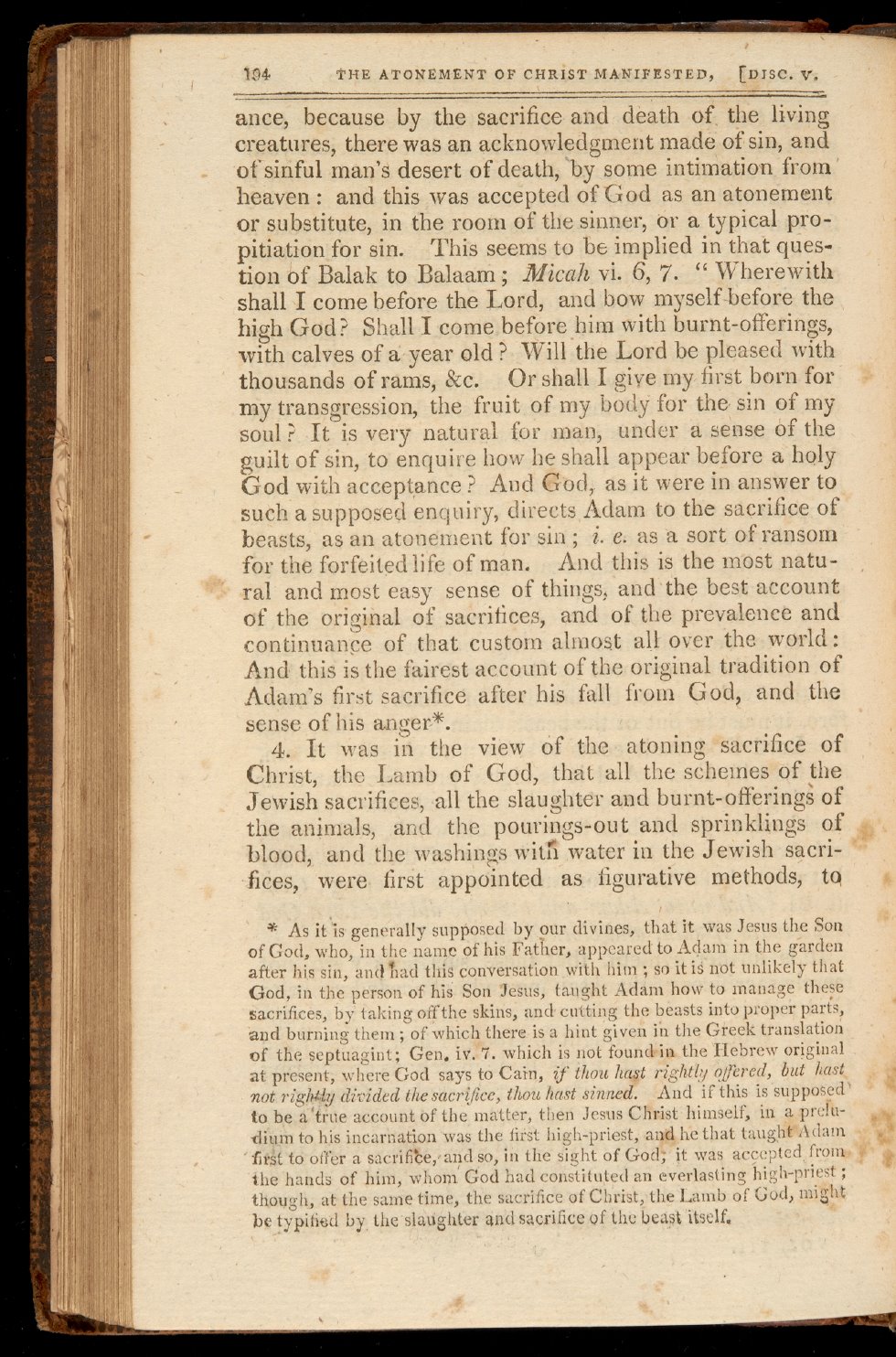

THE ATONEMENT
OF
CHRIST MANIFESTED,
DISC. V.
ance, because
by
the sacrifice
and death
of,
the living
creatures, there
was
an acknowledgment made of
sin,
and
of
sinful man's
desert
of
death,
`by
some
intimation from'
heaven
:
and
this was
accepted of
God
as
an
atonement
or
substitute,
in
the room
of
the sinner,
or
a
typical
pro-
pitiation
for
sin.
This
seems to be
implied in
that
ques-
tion
óf
Balak to Balaam
;
Micah
vi.
6,
7.
" Wherewith
shall
I
come before the
Lord,
and
bow myself-
before the
high
God?
Shall
I
come
before
him with
burnt
-
offerings,
with
calves
of
á year
old
?
Will
the
Lord
be
pleased
with
thousands
of
rams,
&c.
Or
shall
I
give
my,
first
born
for
my transgression, the
fruit of
my
body
for
the
sin
of
my
soul
?
It
is
very
natural
for
man,
under a
sense
of
the
guilt
of
sin,
to
enquire
how he
shall
appear
before
a
holy
God
with
acceptance
?
And
God,. as
it
were
in
answer
to
such
a
supposed enquiry, directs Adam
to
the sacrifice
of
beasts,
as
an atonement
for
sin
;
i.
e.
as
a
sort of ransom
for
the forfeited
life
of
man.
And
this
is
the most
natu-
ral
and most
easy sense
of
things,
and the best
account
of
the
original
of
sacrifices,
and of
the prevalence
and
continuance of that
custom
almost
all
over
the
world:
And
this
is
the fairest
account
of
the original
tradition
of
Adam's
first sacrifice
after
his
fall
from
God, and the
sense
of
his
anger
*.
4.
It
was
in the
view
Of
the
atoning
sacrifice
of
Christ,
the Lamb
of
God,
that
all
the schemes
of
the
Jewish
sacrifices, all
the
slaughter and
burnt
-
offerings
of
the
animals,
and the
pourings
-out
and sprinklings
of
blood, and
the washings
wits
water
in the
Jewish
sacri-
fices,
were first
appointed
as
figurative methods, tq
*
As
it'is
generally supposed by our divines,
that
it
was Jesus
the
Son
of God,
who, in
the name
of
his
Father, appeared
to
Adam in
the
garden
after
his
sin,
and
tad
this
conversation with him
;
so
it
is
not unlikely
that
God,
in
the
person of his
Son
Jesus,
taught
Adam
how to
manage
these
sacrifices,
by taking
off
the
skins,
and
cutting the
beasts into
proper
parts,
and
burning them
;
of which
there
is
a
hint
given in
the
Greek
translation
of
the septuagint; Gen.
iv. 7.
which
is
not foundlin
the Hebrew
original
at
present, where God
says to
Cain,
if
thou
hurt
rightly
offered, but
liest
not
rightiy divided
the
sacrifice, thou hast sinned.
And
if
this
is
supposed'
to
be
a`true
account
Of
the matter, then
Jesus
Christ
himself,
in a prelu-
áium
to his
incarnation
was
the
first
high-priest, and
he
that
taught'Adam
first to offer a
sacrifiçe,'and
so,
in
the sight of God; it
was
accepted,
from
the
hands of him, whom God
had constituted
an
everlasting high-
priest
;
though,
at the same
time, the
sacrifice
of Christ,
the
Lamb of God, might
be typified
by
the slaúghter and
sacrifice
of
the beast'itself

















